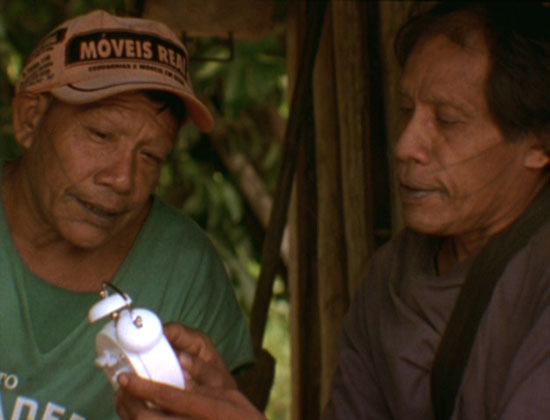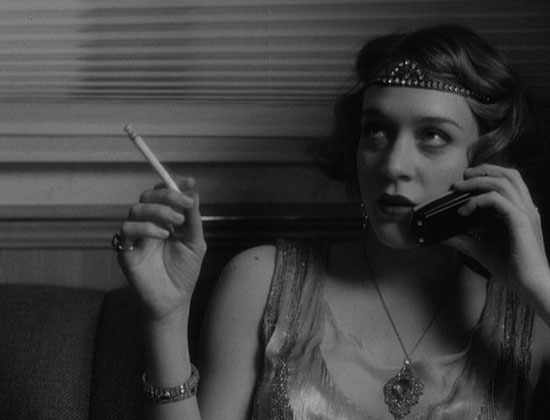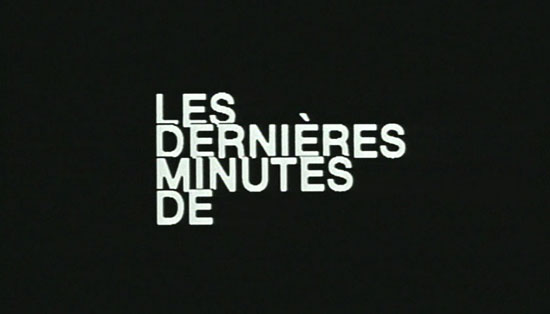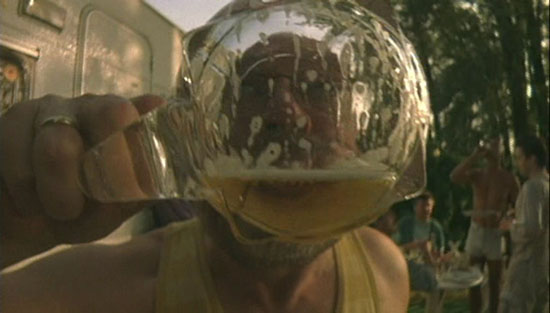Where did this movie come from, and what happened to it? How come this and Chacun du cinema, anthology films with tons of super-famous directors, aren’t well known and out on video? Paris, Je T’aime did pretty well, right? Whatever… we’ve got two 90-minute anthologies here, “The Trumpet” (the first seven listed below) and “The Cello”. Each has short films with the theme of ten minutes, or else something to do with time and the number ten. Each begins with some light jazz, abstract images of water, then the signature of the director on a black background and the title of the short.
–
The Trumpet
–
Aki Kaurismäki – Dogs Have No Hell

More dry wit from Aki. Guy spends the night in jail, gets out and has ten minutes until the train leaves for Siberia (via Moscow). In that ten minutes, he finds a girl he knows, proposes to her, buys a wedding ring and gets them both train tickets. Not much in itself, but a good start to the anthology, setting up the whole ten minutes thing.
VÃctor Erice – Lifeline

A sleeping baby starts bleeding while its twenty-or-more family members are each doing their own thing. Time passes, tension mounts. Someone finally notices the baby and fixes him up, no problem. Great camerawork here! The kid above is listening to a watch he drew on his wrist.
Werner Herzog – Ten Thousand Years Older

A sad ten-minute documentary. Twenty years ago in Brazil, contact was made with the last tribe of people anywhere in the world who didn’t have watches and t-shirts and chicken pox. We gave them all three of those things, the chicken pox killed most of them, and now there aren’t many left. Werner, along with a member from the original team, checks up on them. The younger generation is embarrassed by their parents, want to move to the city. The older ones, represented by the war chief (above right, with his brother on left) ponder their fates and the passage of time.
Jim Jarmusch – Int. Trailer Night

Chloe Sevigny tries to unwind in her trailer on a film shoot for ten minutes. There are interruptions. It’s pretty, but what else is it?
Wim Wenders – Twelve Miles to Trona

Wenders manages to make a ten-minute desert road movie. This is kinda hilarious actually… straight guy accidentally overdoses on unknown hallucinogenic drug, has to drive himself to the hospital in another town ten minutes away. He doesn’t make it, but a passerby gets him there and he’s okay. Looked a bit like one of those Masters of Horror episodes where they mess with the camera to make things look trippy, but it pulled me in pretty well. They played two loud Eels songs from the Souljacker album.
Spike Lee – We Wuz Robbed

A compressed mini-doc about Bush II stealing the 2000 presidential election from Gore (with help from the mass media and supreme court), snappy and nicely done, using all interviews and TV news graphics.
Chen Kaige – 100 Flowers Hidden Deep

Crazy guy brings a moving company to a dirt lot to move his furniture. Finally they pretend like they’re moving furniture to appease the guy, until one mover “drops” a “vase” and breaks it. Not great, but cute. Wish it didn’t end with an awful, sub-2046 wireframe 3D animation though.
–
The Cello
–
Three of the seven Trumpet shorts made me tear up with emotion (hint: Spike Lee yes, Wim Wenders no), but most of the Cello disc left me sad, tired or bored. Huge difference there, but I’d rather have it that way than have the crap diluting the good stuff over both discs. If only the Michael Radford short had been on the Trumpet disc, I could’ve just sold Cello.
Bernardo Bertolucci – Histoire d’eaux

I kinda liked this, but it still gave me a sort of “uh oh” feeling about The Cello when it started. Foreigner (Indian?) is in Italy with a pile of other foreigners, confused thinks he’s in Germany. Old guy wanders away from the group asks our man for a drink of water. Our man finds a girl, fixes her motorcycle, marries her, has kids, gets a nice job, buys a car, crashes the car, wanders off from the car crash site and sees the old man still waiting for his water.
Claire Denis – Vers Nancy

A dry, academic conversation on a train about outsiders & foreigners, with the writer and one of the actors of Denis’ 2004 feature The Intruder. I haven’t seen Intruder, but this is obviously a companion piece, prequel or commentary on it. It almost put me to sleep, and I wasn’t even tired.
Mike Figgis – About Time 2

Figgis was the oscar-nom director of Leaving Las Vegas, but I don’t think the producers of Ten Minutes Older realized that in 2002 his career was on the verge of death after Timecode and the critically bashed Hotel (it would die for real the following year with Cold Creek Manor). This is a nonsense short, shot Timecode-style. So far, it is the least-bearable ten minutes I have watched this year… I was itching to fast-forward.
Jean-Luc Godard – Dans le noir du temps

In collaboration with Anne-Marie Miéville, I think this was actually a trailer for Histoire(s) du Cinema. They’re definitely related. The most unfortunate similarity to Histoire(s) is that this was only partially translated – none of the onscreen French text has subtitles.
Jirà Menzel – One Moment

A very nice tribute (using archive footage) to Czech actor Rudolf HrusÃnský who acted in more than ten of Menzel’s movies and died in 1994.
Michael Radford – Addicted to the Stars

Guy travels 80 light years in suspended animation in a space capsule, gets back to earth and doctors say he has only aged ten minutes. Goes to visit his son, who was a young boy when he went away, now a very old man. Movie has an awesome sci-fi look to it, and I liked the story and atmosphere – a very nice short, my favorite of the Cello bunch. Fresh off Lara Croft Tomb Raider, Daniel Craig starred as the astronaut.
Volker Schlöndorff – The Enlightenment

Camera zooms around an outdoor party while unseen narrator ponders the nature of time. At end camera flies into a bug light and dies. It turns out we have been a mosquito. Har!
István Szabó – Ten Minutes After

Szabó is the Hungarian director of Lovefilm and Sunshine – I haven’t seen anything else of his. A husband comes home extremely drunk and angry, starts storming around the house while his wife watches upset, “what’s wrong? you never drink!”, finally he tries to strangle her, she stabs him, emergency crew arrives in like fifteen seconds, cops question her, the end. Why? I thought it was gonna be all one long shot, but then I saw a cut towards the end, so there were probably a couple others.














